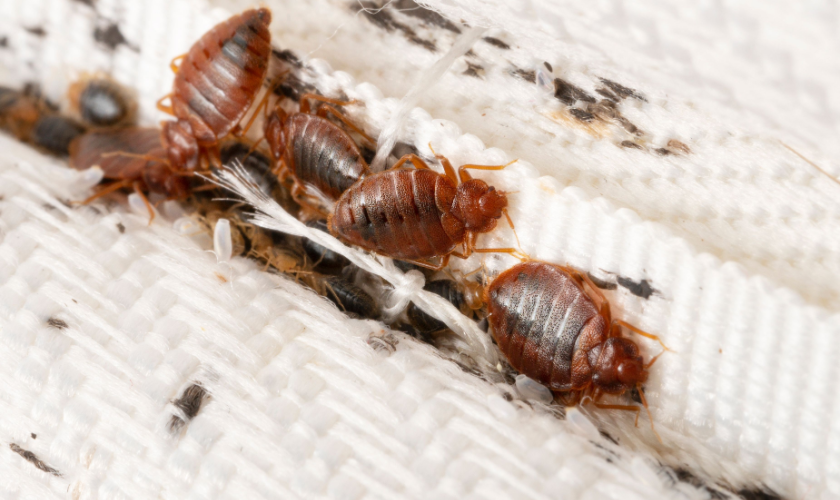Kings Bed Bug Exterminator Cincinnati: Pro Pest Solutions
Kings Bed Bug Exterminator Cincinnati: Pro Pest Solutions
Blog Article
Kinds Of Pest Control: Which Approach Is Right for Your Invasion?
When faced with a parasite problem, the choice of an appropriate approach for pest control is vital in successfully handling the scenario. By checking out the various types of insect control methods offered, people can make informed decisions customized to their distinct scenarios, guaranteeing a more reliable and lasting result in pest eradication.
Chemical Insect Control
Chemical bug control involves making use of artificial or normally derived chemicals to handle and remove pest populaces effectively. This approach is commonly utilized in agriculture, forestry, and domestic settings to fight a large range of pests, consisting of insects, weeds, and rats. Using chemical pesticides can give quick and targeted options to pest problems, making it a prominent choice for numerous individuals and companies.
One of the crucial advantages of chemical parasite control is its capacity to quickly eliminate pests, minimizing the risk of damages to plants, building, and human health. By utilizing particular chemicals that target certain parasites, this approach can properly control infestations while decreasing harm to valuable organisms and the setting when used correctly.
Nevertheless, making use of chemical pest control also raises issues regarding potential damaging effects on non-target varieties, water resources, and human health and wellness. It is essential to comply with safety standards, use chemicals responsibly, and consider alternate pest control approaches to minimize these threats and make certain sustainable insect monitoring techniques.
Biological Insect Control
Biological parasite control, likewise recognized as biocontrol, uses living organisms to take care of and decrease parasite populations normally. By utilizing the insect's all-natural predators or microorganisms, biological pest control provides a ecologically friendly and lasting service to pest administration.

Mechanical Pest Control
Making use of physical and manual approaches to take care of parasite populaces, mechanical bug control uses an alternate method that does not rely upon making use of living organisms or synthetic chemicals. This method entails using barriers, traps, or other tools to literally discourage or eliminate pests. By obstructing bug access factors or establishing traps to capture them, mechanical bug control can efficiently reduce infestations without introducing chemicals right into the environment.
One usual instance of mechanical insect control is the use of mesh displays on doors and windows to stop bugs from entering structures. This straightforward yet efficient method works as a physical barrier, maintaining bugs out while enabling proper ventilation. Additionally, devices like mousetraps, fly swatters, and ultrasonic repellents drop under the mechanical insect control group.
While mechanical pest control techniques can be labor-intensive and require routine monitoring and upkeep, they offer a lasting and ecologically friendly service for handling parasite problems. By combining different mechanical methods, residential property proprietors can produce an extensive bug control method that decreases reliance on chemical pesticides.
Physical Parasite Control

Some typical physical pest control methods consist of using obstacles such as screens or nets to avoid insect entry, catches to catch and remove pests, and hand-picking to literally eliminate insects from plants or frameworks. In addition, methods like heat therapies can be utilized to control parasites like bed insects by raising the temperature level to levels that are lethal to the bugs.
Physical insect control is particularly beneficial in integrated parasite administration (IPM) techniques, where numerous insect control methods are integrated for effective insect management while minimizing the usage of chemicals. By using physical insect control strategies, individuals can successfully resolve parasite infestations with minimal ecological effect.
Integrated Parasite Administration
When implementing physical insect control techniques as part of parasite management approaches, Integrated Insect Administration (IPM) becomes a detailed technique that leverages different strategies to successfully control pest populations. IPM concentrates on lasting avoidance of bugs through a combination of organic, social, physical, and chemical devices tailored to specific pest issues. By incorporating numerous control tactics, IPM aims to decrease the risks related to bugs while additionally reducing reliance on chemical options.
One trick facet of IPM is the emphasis on monitoring and evaluating pest populaces to establish one of the most appropriate control methods. This positive technique permits for very early treatment and targeted approaches, leading to much more effective insect administration. Furthermore, IPM advertises eco-friendly techniques by focusing on non-chemical control approaches and just utilizing chemicals as a last hotel.
Verdict

By utilizing the bug's all-natural predators or pathogens, biological bug control supplies a sustainable and environmentally pleasant option to pest administration. - Kings pest control Cincinnati Ohio
Utilizing physical and hands-on methods to manage pest populations, mechanical insect control provides an alternate technique that does not rely on the use of living organisms or synthetic chemicals.An efficient strategy to handling pest populaces without counting on chemical or organic methods involves the usage of physical parasite control methods.When carrying out physical pest control techniques as component of insect management strategies, Integrated Pest Management (IPM) arises as a thorough strategy that leverages different techniques to effectively regulate pest populaces. Chemical bug control includes the use of chemicals, organic parasite control utilizes all-natural predators, mechanical pest control entails physical obstacles, physical insect control consists of capturing or getting rid of bugs, and integrated pest monitoring integrates multiple approaches for an alternative method to pest control.
Report this page